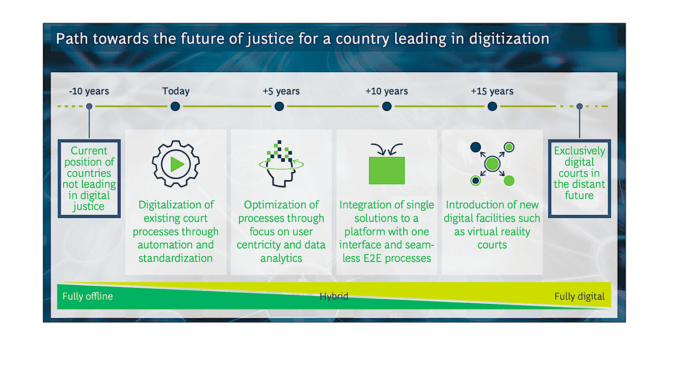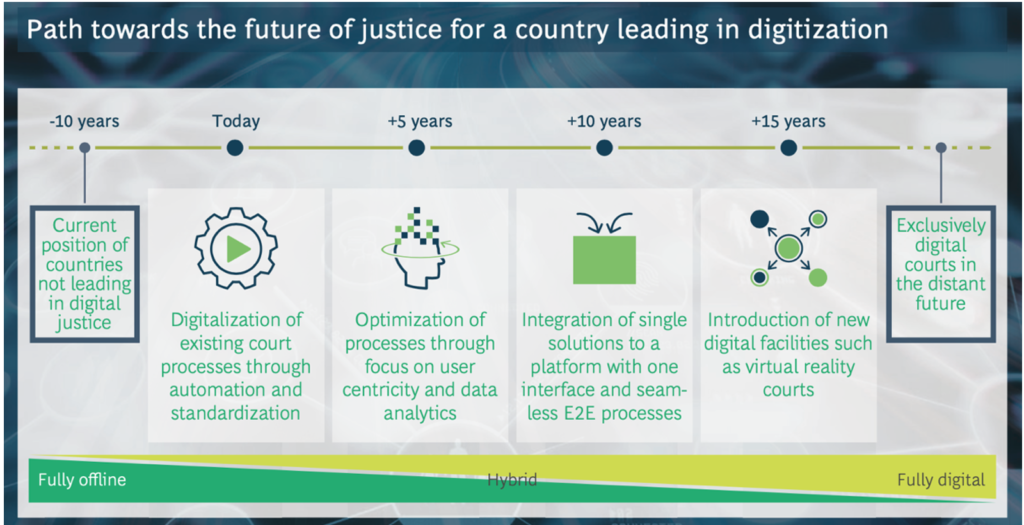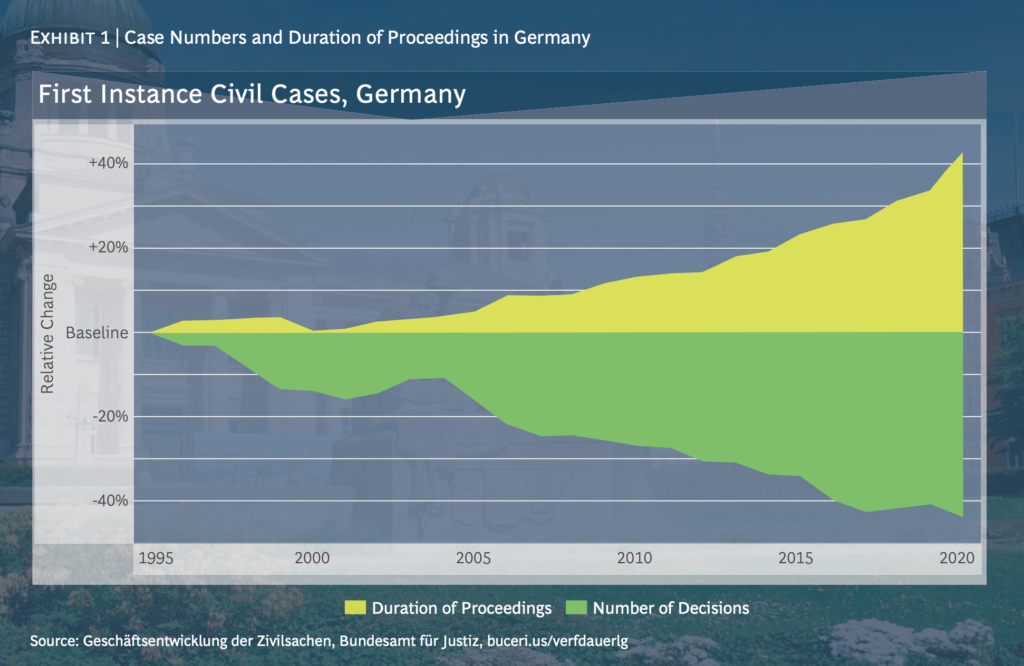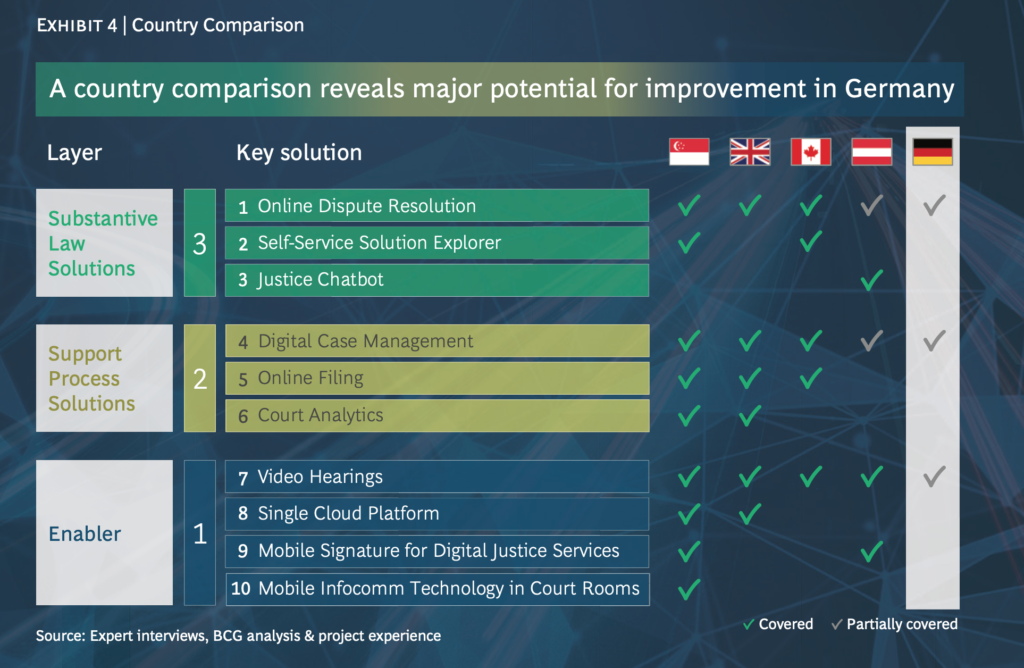
A study of what needs to be done to modernise the German court system has concluded that one possible future will to be move some court hearings into the virtual reality world – i.e. not just online, but using a ‘metaverse’ type of setting, so judges, lawyers and witnesses can interact in new digital ways.
The ‘Future of Digital Justice’ study by Bucerius Law School, strategy consultancy Boston Consulting Group, and the Legal Tech Association Germany, conducted nearly fifty expert interviews to compare the state of digitization of the justice system in Germany with Singapore, Canada, the United Kingdom, and Austria. It then mapped out the future and what needs to change.
The report notes that: ‘While the business world went from emails and text on static websites to instant messaging and video on mobile devices and is on the cusp of virtual reality, many courts still require printed documents, wet signatures, and in-person appearances.’ I.e. things need to modernise.
Some of the key possibilities for future courts include:
- ‘When it is beneficial to the solution of the disputes, hearings will be conducted in virtual reality. This will allow judges and parties to experience relevant details more directly and go beyond possibilities in the physical space.’
- ‘In order to improve accessibility, court processes will be designed in a more user-centric manner. This includes self-service tools to understand the law and explore potential legal remedies and procedures without the need for professional assistance.
- ‘Expert systems could help determine the most appropriate process for a party seeking resolution of a legal conflict.’
Generally this site is quite sceptical about the use of virtual reality in the law, e.g. why bother with disembodied avatars when a lawyer can just pick up the phone and call a client, or do a Teams call? For a lot of day-to-day activities going virtual feels like an unnecessary complication.
However, for a court hearing where there is a strong emphasis on being visibly present in a specific location, then one can see the argument in favour of this virtual reality approach – at least for certain cases. It allows things to remain digital and online, but also brings an element of physical presence, (and of course it’s only ever going to be at best a representation of physical presence and sometimes a fairly odd one at that). But, as the technology improves, one could imagine virtual reality court hearings in some lower level civil case scenarios. It may, as the report alludes to, also allow new ways of presenting evidence that could be more effective than is currently possible with just video-based hearings.
That said, Artificial Lawyer would always argue in favour of in-person hearings for major cases, as there is too much at stake that could be ‘lost in digital translation’. Juries and judges need to see the accused right in front of them when it comes to a very serious charge. They also need to see the witnesses up close and personal to help gauge their credibility. But, for lower-level cases, especially in the civil claims world, then one can see the benefits.

The report’s suggested use of self-service information portals and expert systems to help people involved in a court case also makes sense – up to a point. There are of course times when you do really need a living, breathing human expert to provide guidance in what will always be a very stressful and confusing situation for most people who don’t usually attend court hearings. And it’s worth mentioning that several projects of this self-serve type already exist around the world.
Background
As to why the focus on Germany’s court system, the report authors highlighted that it’s down to two things: first, there are far more civil court cases in Germany now than ever before (see below) and they are lasting longer, and secondly, the authors believe that Europe’s largest economy has fallen behind other developed nations, especially Singapore and Canada, see below.

While talk of virtual reality courts may sound pioneering, the report focuses most of its attention on the need to just fix basic things, such as digital case management and moving things online.
Philipp Plog, Chairman of the Board of the Legal Tech Association Germany and co-author of the study, and a partner at Fieldfisher, said: ‘The study shows particularly well that comprehensive reform can also and especially succeed in federal systems, based on a project in Canada.’
The report then highlights the Civil Resolution Tribunal in British Columbia, which they call ‘possibly the most advanced online court in the world’.
They note that all interactions with the court and its systems are entirely digital. The court has completed a total of nearly 20,000 disputes with very high user satisfaction: nearly 85% (including losing parties) would recommend it to others, the report noted.

‘With the study and the positive examples from other federal nations, we hope above all to reach the justice ministers of the states in Germany so that we can quickly move into concrete implementation,’ Plog concluded.
You can find the full report here.
—
The report authors are:
- Dirk Hartung is the founder and executive director of the Center for Legal Technology and Data Science at Bucerius Law School. He serves as the corresponding author for this report.
- Florian Brunnader is a principal at BCG and focuses on insurance, digital, and managing large-scale programs (transformations, PMI, DD).
- Christian Veith is a former senior partner and managing director at BCG and chair- man of the Board of Trustees at Bucerius Law School.
- Philipp Plog is managing partner at Fieldfisher Germany and chairman of the Board of Legal Tech Association Germany.
- Tim Wolters is head of business development and strategy at German digital law firm Rightmart and oversees the Legal Needs section of Legal Tech Association Germany.